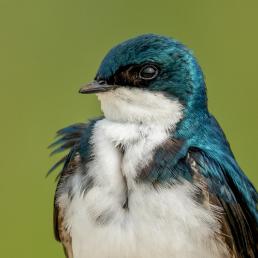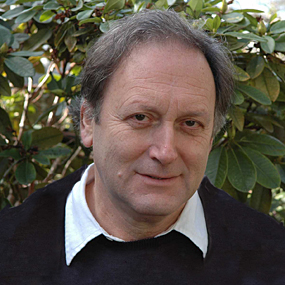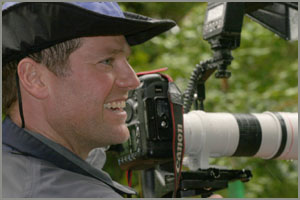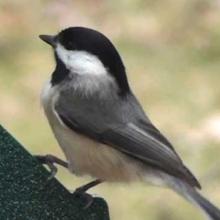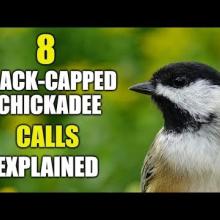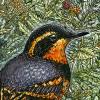

Join BirdNote tomorrow, November 30th!
Illustrator David Sibley and actor H. Jon Benjamin will face off in the bird illustration battle of the century during BirdNote's Year-end Celebration and Auction!
In spring, the Black-capped Chickadee adds a new vocalization to its repertoire. When breeding season begins, the tiny brains of Black-capped Chickadees and other songbirds enlarge to enable the birds to create more sounds. After the breeding season is over and the birds no longer need that singing function, the part of the birds' brains that controls vocalizations decreases in size. Read this fascinating article about the research of Fernando Nottebohm on the brain behind bird song.
BirdNote®
Black-capped Chickadee - Birdbrain?
Written by Frances Wood
This is BirdNote!
[Year-round vocalization of Black-capped Chickadee]
We’re hearing the year-round sound of the Black-capped Chickadee.
[Year-round vocalization of Black-capped Chickadee]
In spring, however, Black-capped Chickadees add a new vocalization to their repertoire, this soft fee, bee, bee. [Black-capped Chickadee fee-bee-bee song.]
When breeding season begins, the tiny brains of chickadees and other songbirds enlarge to enable the birds to create more sounds. After the breeding season is over and the birds no longer need that singing function, the part of the birds’ brains that controls vocalizations decreases in size.
Studying the ability of a bird’s brain to generate new neurons in order to sing in the spring [Fee bee bee] fundamentally altered how scientists think about the human brain—and opened the door for new research on understanding degenerative brain conditions, including Parkinson’s and Alzheimer’s diseases.
One of the scientists studying neuron replacement in birds’ brains is Fernando Nottebohm of Rockefeller University in New York. After first studying the brains of canaries and finches, he focused on the remarkable ability of Black-capped Chickadees to store hundreds of seeds and recall their locations when needed.
It seems we might want to rethink how we use the term “bird brain.”
[Mixture of chick-a-dee-dee-dee call and fee, bee, bee song.]
You can learn a lot more about Nottebohm’s research, when you come to our website, birdnote.org. I’m Frank Corrado.
# # #
Call and song of the Black-capped Chickadee provided by The Macaulay Library of Natural Sounds at the Cornell Lab of Ornithology, Ithaca, New York. Call recorded by R.S. Little. Song recorded by G.A.Keller.
Producer: John Kessler
Executive Producer: Chris Peterson
© 2011 Tune In to Nature.org March 2011 Narrator: Frank Corrado
ID# 040405BCCHKPLU BCCH-02b
